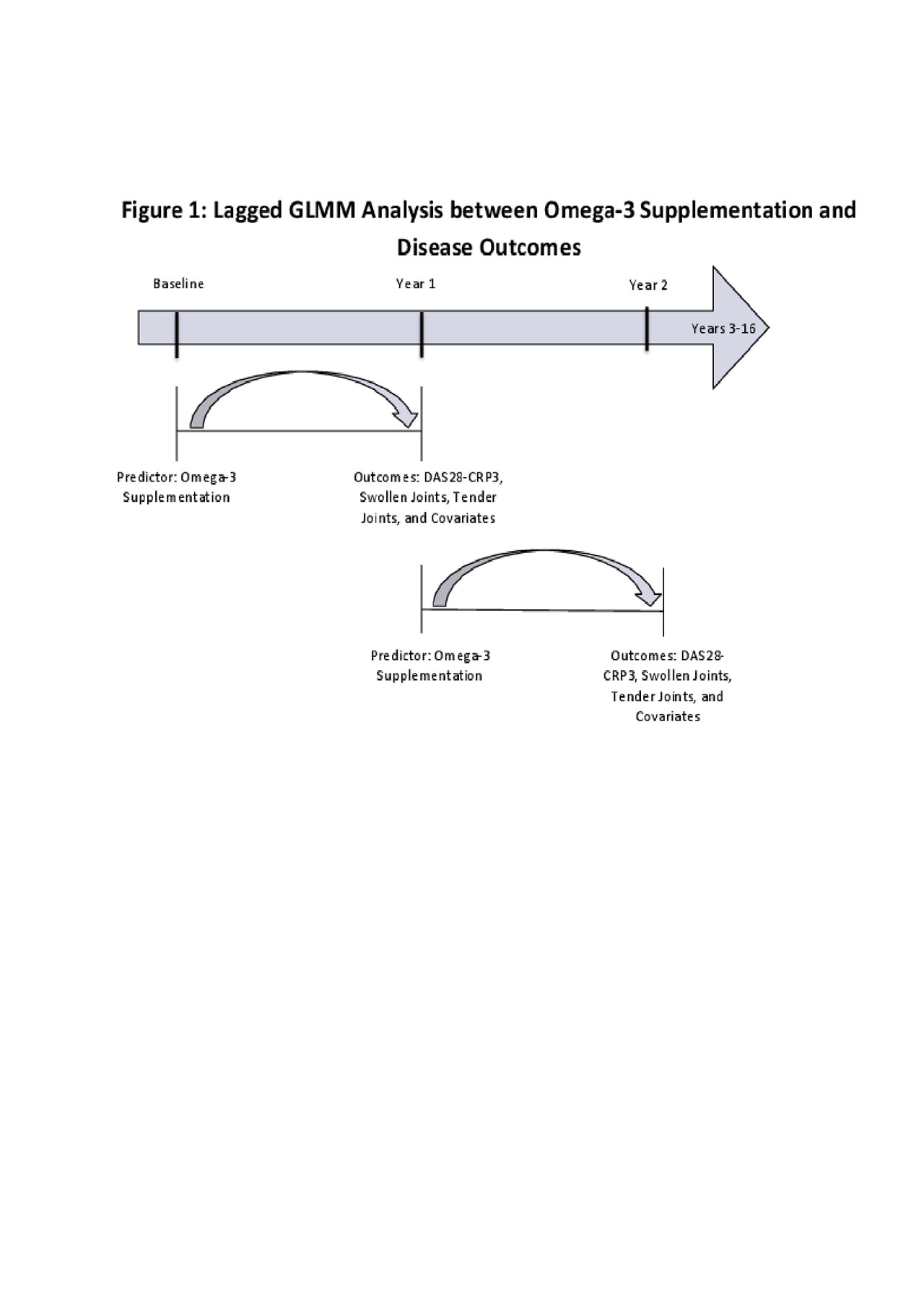Session Information
Session Type: ARP Abstract Session
Session Time: 2:30PM-4:00PM
Background/Purpose: Omega-3 supplementation is one of a few complementary and alternative medicine (CAM) therapies that has shown promise in improving RA symptoms through small, randomized control trials. However, there is little research looking at the association of disease activity of RA patients and omega-3 supplementation. This study aims to identify the association between disease activity of RA patients who do and do not take omega-3 in an observational longitudinal cohort.
Methods: Data from a longitudinal RA registry was used for this study. Information concerning use of herbal medications, including omega-3 supplementation, was collected semi-annually. Subjects ever reporting use of fish oil, flaxseed, docosahexanoic acid (DHA), eicosapantaenoic acid (EPA), and alpha linolenic acid (ALA) at least once were identified as an omega-3 user. First, we compared demographic and clinical characteristics between omega-3 users and omega-3 non-users at the date of first supplementation for users and date of cohort enrollment for non-users. Then, a generalized linear mixed model (GLMM) analyzed associations between subjects’ omega-3 supplementation and the outcomes, Disease Activity Score (DAS28-CRP3), painful joint count, and swollen joint count one year later. The lagged model (Fig. 1) controlled for repeated measures and adjusted the outcomes for age, gender, education, seropositivity, steroid, NSAID, biologic and methotrexate use.
Results: Overall 1,557 subjects had a mean age of 56 years (± 14), with a median disease duration of 12 (8, 20) years. Subjects were 92% white, 82% female, and 57% had a college degree or higher. Of all participants, 640 indicated that they had taken an omega-3 supplement at least once. The average duration of omega-3 supplementation was 33 months. Omega-3 users were more likely to be female (p=0.02) with a higher education level (p=0.001) (Table 1). The lagged GLMM showed that omega-3 users were more likely to have a significantly lower DAS28-CRP3 (p< 0.0001), painful joint count (p=0.001), and swollen joint count (p=0.0009) 1 year later after adjustment for seropositivity, demographic and medication variables. (Table 2).
Conclusion: The data suggest that independent of clinical, demographic and medication variables, patients from an observational cohort who take omega-3 supplementation are more likely to have lower DAS28-CRP3 scores, less painful joints, and less swollen joints. These findings suggest the need for further study of omega-3 supplementation with particular attention to dosage and duration of use as an adjunct to conventional medicine for RA.
To cite this abstract in AMA style:
Andemeskel A, Feathers V, Iannaccone C, Cui J, Shadick N. The Association Between Omega-3 Supplementation and Disease Activity in a Rheumatoid Arthritis (RA) Observational Cohort [abstract]. Arthritis Rheumatol. 2019; 71 (suppl 10). https://acrabstracts.org/abstract/the-association-between-omega-3-supplementation-and-disease-activity-in-a-rheumatoid-arthritis-ra-observational-cohort/. Accessed .« Back to 2019 ACR/ARP Annual Meeting
ACR Meeting Abstracts - https://acrabstracts.org/abstract/the-association-between-omega-3-supplementation-and-disease-activity-in-a-rheumatoid-arthritis-ra-observational-cohort/



